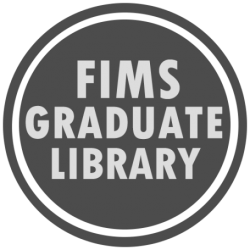New Book Highlights – Fall 2025
This highlight features some of the new books available at the FIMS Graduate Library. Browse the FGL Collection to see what other books we have available.
Special thanks to Student Library Assistant, Michaela McBryde, for their work in compiling this book list.

Busting the Myth of the Communication Metaphor: How Technical Writing Conventions Perpetuate Injustice
Sarah Read
T11 .R36 2025
Effective communication is essential in every profession and this book challenges readers to think critically of how and what they are communicating. Starting by calling out the not-so-objective standards that are currently in place for technical writing, the book then moves through critical analysis of communication conventions and suggestions for more equitable alternatives.

The Speed Storytelling Toolkit
Felicity Cowie
HD59 .C695 2025
Filled with prompts to help you hone your storytelling skills, this book is designed to help you set yourself apart from your competitors as quickly as possible, building yourself up as a go-to in the field. Distilling storytelling into core components that will help readers tell their story quicker and more compellingly, this book is great for those wanting to promote their business or build professional relationships.

A NewsHound’s Guide to Student Journalism
Katina Paron and Javier Guelfi
LB3620 .P37 2024
In short, easily digestible chapters, this book outlines best practices for investigative journalism including recognizing conflicts of interest, the value of independent sources, resisting plagiarism, and more. The comics illustrate the investigative process the authors recommend, complementing the text in a fun and creative way. The authors also include the real-life examples of journalists implementing these practices that inspired the comics case studies and activities for readers to practice these skills.

Platform Power and Libraries
Christine F. Smith
Z674.7. P53 2025
This book explores the power and responsibility libraries have to advocate for patron rights when it comes to the platforms they use. In five distinct sections, scholars outline 1) what this topic is and why it’s important, 2) digital property regimes in public libraries, 3) the effect of streaming platforms on academic library services, 4) digital heritage, and 5) academic publication and data surveillance. With plenty of footnotes and citations for each chapter, this book also provides direction for further research if you’re interested in learning more.

Index, a History of the: A Bookish Adventure from Medieval Manuscripts to the Digital Age
Dennis Duncan
Z695.9 .D86 2024
This book dives into the history of the index found at the back of so many book. Spanning the history of its invention to modern day uses, this book is filled with stories of how indexes have been used and have benefitted readers and scholars. Despite seeming like an uninteresting topic for reading, this book is written in a way that draws readers in with illustrations and examples to help them better understand the importance of indexes in modern and historical works.

The Visual Identity of the Book: From the Renaissance to the Digital Age
Christina Banou
Z246 .B35 2025
Over time, the aesthetics of the physical book has changed and developed with availability of materials and societal preference. This book explores “book culture” throughout history and the thought that publishers put into crafting eye catching covers. It also addresses the resurgence of books as “luxury items” with special editions fit for home decoration, a trend that is not new to the publishing world. The appendix is filled with colour images of carefully crafted books and book pages to complete the journey.

After Mass Media: Storytelling for Microaudiences in the Twenty-first Century
Amanda D Lotz
PN1992.55 .L68 2025
After Mass Media explores the shift in how stories are now being told and shared, adapting in response to the societal changes coming from mass media. Streaming has changed how series are structured, the size of the budget, the cultures that can be represented for “microaudiences”, and so much more. This book uses data and evidence to analyze the changes we are seeing and understand what these changes mean for society in return.

Writing a Proposal for Your Dissertation: Guidelines and Examples
Steven R. Terrell
LB2369 .T44 2023
With evidence-based advice, definitions, and examples, this book supports students in writing dissertation proposals. The chapters are clearly laid out in a logical order and have many tables and figures to assist the reader in understanding. There is also a detailed index to help navigate for quick reference during the busy and often stressful process of writing a dissertation.

The AI Con
Emily M. Bender
Q335 .B458 2025
The authors of this book cut through the noise and lay out the facts of AI in our society. They identify the continuing biases in the systems that mean AI is not as effective as its cheerleaders claim but they also point out the benefits of AI that counter the naysayers’ claims that AI is ruining the world. This book presents a more neutral look into an issue that raises plenty of extreme views, focusing on the facts at the root of AI issues.
